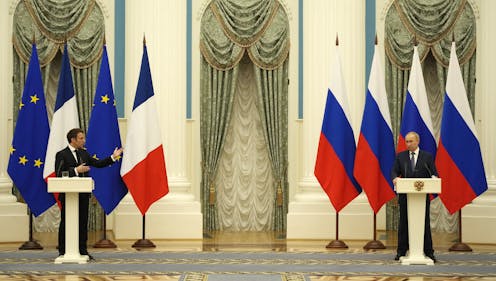
On Victory Day — the May 9 commemoration of the former Soviet Union’s defeat of Nazi Germany in the Second World War — Russian President Vladimir Putin was expected to officially declare war on Ukraine.
However, Putin didn’t mention escalating the war in his speech. Is it any coincidence that on the same day, France’s President Emmanuel Macron, who also holds the European Union presidency, dismissed or delayed the prospect of Ukraine’s membership in the EU?
Secret backroom deals are a common diplomatic tool, as I examine in my research Power and Influence: The Embeddedness of Nations. Unfortunately, because of the necessary secrecy that enables freer discussions so that agreements can be reached, it’s unlikely we’ll ever learn about a trade-off involving Ukraine joining the EU — if there was one.
My research has found evidence of reciprocity in international relations through a large analysis of data on several years of international trade, military alliances, diplomatic visits and intergovernmental organizations in terms of voting in the United Nations General Assembly.
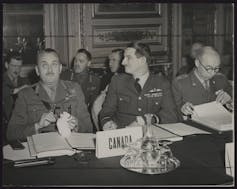
The analysis found evidence of patterns of reciprocal behaviour among nations. Previously, we only knew of isolated cases of backroom bargaining after the details had been revealed. For example, the friendly North Atlantic Treaty negotiations of 1948-49 were well-documented but not made public until much later.
My research sheds light on the types of international power and influence relationships that often lead to backroom bargaining and the trading of favours.
Circumstantial evidence
In the absence of spies, whistleblowers, secret recordings or co-operative circumstances where all parties agree to document their discussions, all we can usually do is consider circumstantial evidence in cases of suspected backroom bargaining.
For example, one well-known fact is that Macron and Putin have a unique relationship. Unlike other western leaders, Macron has kept the doors of communication open and spoken several times to Putin, and travelled to Moscow prior to the war, with an aim to end Russia’s aggression in Ukraine.
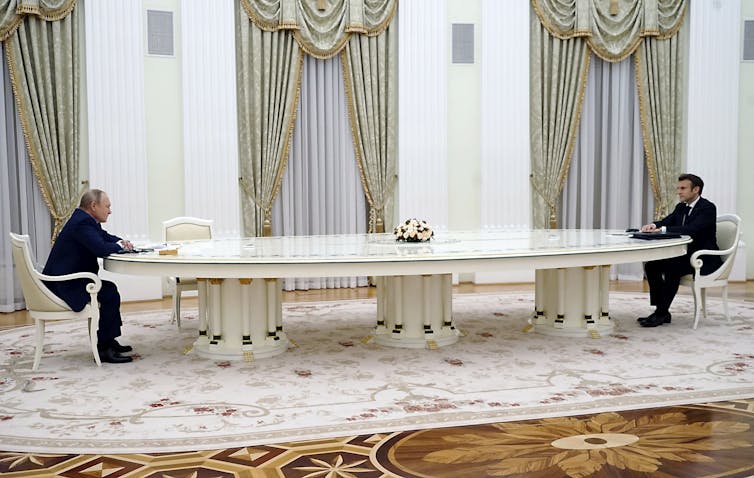
Unfortunately as it pertains to the Macron-Putin relationship, my research suggests that those who are sought out for meetings are in stronger positions than those who seek the meetings. Macron initiates most meetings and calls with Putin, but Putin is an ex-KGB agent who knows not to give anything away.
Putin does not actually engage in much dialogue with Macron. Instead, he gains information through Macron’s actions. As long as Macron continues his diplomatic efforts, Putin knows that Macron still believes that diplomatic solutions could work.
By having conversations with the EU’s president, Putin has greater potential for exerting some influence in that realm — and more time to continue his Ukrainian invasion. If Macron stops the visits and communications, my research suggests Putin may wonder if his time is running out.
Putin’s war drags on
Putin’s war has dragged on for longer than he expected, according to western intelligence. Putin might retort that all is going according to plan. But it’s undeniable that brave, resilient Ukrainians refuse to surrender regardless of Russian efforts.
For this reason, Macron may believe that Putin wants to negotiate a way out the war after so much embarrassment, exhaustion and failure. But the day after Victory Day, Russia attacked Odesa. The same day, Macron publicly pushed for an oil embargo on Russia, as if in retaliation for the betrayal in Odesa.
Prior to Victory Day, Macron initiated a call with Putin on May 3 and that’s believed to be the last time they spoke.
Putin has studied western leaders for decades through his direct interactions in international meetings. Evidently, he understands them better than they understand him. Putin has managed to set the terms of engagement, for example, by telling the West not to intervene at the very start of his invasion, and NATO has stayed out.
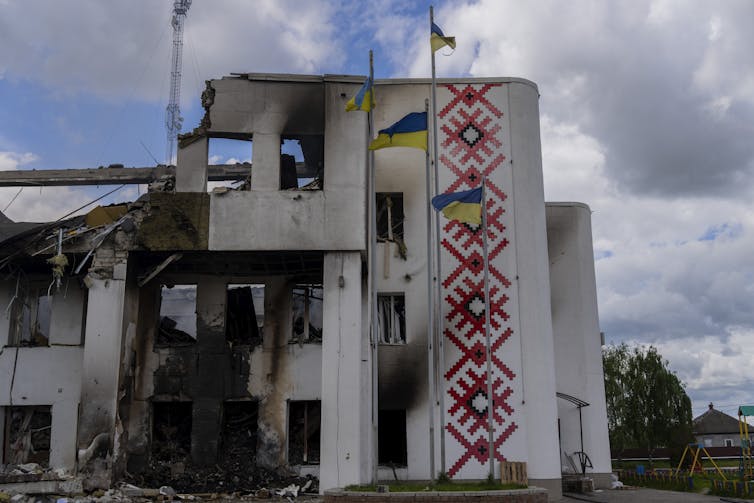
Power and influence
In addition to examining the influence of diplomatic relations, my research also considers whether military alliances, international trade networks and common memberships in intergovernmental organizations affect the potential for reciprocity in bargaining.
First, military alliance agreements aren’t always executed as expected and consequently aren’t reliable predictors of other types of reciprocity. An example is the misplaced Ukrainian belief that the country could rely on NATO for defence because Ukraine was a potential future member that gave up nuclear weapons. Clearly, that deal didn’t pan out.
Nervousness among western states is visibly mounting as Sweden and Finland reach out to the United Kingdom for future protection, including NATO membership, but it’s unclear whether this would represent reliable insurance.
Also, more trade among countries doesn’t have much of an effect on reciprocity. Contrary to popular beliefs that trade can peacefully tie nations together, that’s hardly the case as Russia threatens European nations by cutting off gas supplies.
Russia’s biggest trading partners are China and several European countries. China’s largest trading partners, however, are the United States and several Asian nations, not Russia. Yet China has not sided with the West and Ukraine in the war, and has instead condemned western sanctions against Russia.
My research shows that countries dependent on trade with more prominent trading nations will reciprocate. The dominant trading powers don’t reciprocate, even if they have strong trade ties.
Members of the same clubs
Nations in a number of the same intergovernmental organizations, like the Organization for Economic Co-operation and Development or the World Trade Organization, may also be more likely to bargain, possibly because they develop similar views.
Russia joined many of these organizations in the post-Soviet Union era, but has since been expelled from many of them.
Today, we know that Putin’s Russia holds vastly different views than the West, and that Putin is solidifying this by controlling the information provided to Russians.
The application of my research, along with Putin’s obvious desire to resurrect the Soviet era, points to the inevitable conclusion that Putin won’t end the war in Ukraine unless he’s stopped.
Any of Putin’s agreements, statements — or even a lack of statements, like in his Victory Day speech — only serve to buy more time for his invasion. In those remarks, he seems to have been purposely doing the opposite of what western media expected because his aim is unpredictability, a common war-time tactic.
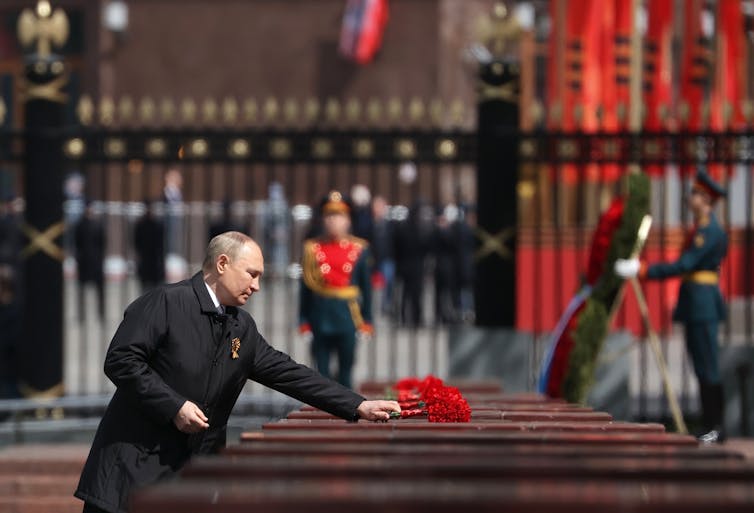
The evidence suggests that diplomacy is unlikely to work with Putin. The West should not delay action based on speculations about his intentions, or compromise on substantial issues for Ukraine such as joining NATO or the EU. Instead, the West should increase punitive sanctions against Russia and its associated allies, and engage in a full defensive effort against Putin and Russia.
Putin is single-mindedly moving ahead on his goals, regardless of setbacks, as promised. For now, it appears he’ll only be stopped when he runs out of resources and troops or is removed from power.
Deborah de Lange has received funding from SSHRC (Canada) and ESRC (UK).
This article was originally published on The Conversation. Read the original article.







